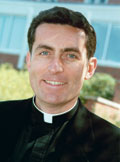A Jesuit priest from Massachusetts who has written extensively about moral theology and ethics has been named the 24th president of Loyola College in Maryland.
Jesuit Father Brian Linnane, who currently serves as assistant dean and associate professor of religious studies at the College of the Holy Cross in Worcester, Mass., will take office in July at the Baltimore college, succeeding Jesuit Father Harold Ridley, who died Jan. 18.
Father Linnane said he plans to continue Father Ridley’s focus on cultivating an atmosphere of rigorous academic standards. The 49-year-old priest hopes to improve diversity at Loyola and encourage students to have international experience.
He said it is vital that as a Catholic college the school challenges students to live “intentional lives for others.” The high percentage of Loyola students who volunteer through the school’s Center for Values and Service was one of the attributes that attracted him to Loyola, Father Linnane said.
“We must help students understand the common good and how their well-being is intimately tied to the well-being of those who are not as fortunate as they are,” Father Linnane said.
Loyola “can’t be Catholic” without challenging students to search for remedies to social injustices, said Father Linnane, a member of Loyola’s board of trustees since 2000.
Born into an Irish-Catholic family, Father Linnane wanted to be a Jesuit priest since he was in the fourth grade at his parish elementary school. An altar boy, he was inspired by a book about the Jesuit North American martyrs, who ministered to American Indians.
“I was very taken with how brave they were in coming to the New World,” remembered Father Linnane. “It was very dramatic and so heroic.”
Father Linnane entered the Society of Jesus in 1977 and was ordained a priest in 1986. He graduated magna cum laude from Boston College in 1977, earning a master’s degree from Georgetown University’s department of government in 1981. Father Linnane also holds a master’s degree in divinity studies from the Jesuit School of Theology and two master’s degrees and a doctorate from Yale University’s department of religious studies.
In 1994 Father Linnane joined the religious studies department at Holy Cross, where he was a popular teacher of Christian ethics, morality, medical ethics and virtue theory.
The theology professor said he loved exposing students to the Catholic moral tradition. Most young people think they lead ethical lives, based on their feelings and their belief that if an outcome seems good it must be moral, according to Father Linnane.
“We begin to look at the ways in which that generates all sorts of problems and try to think about the formation of conscience and the role of church teaching in individual lives,” he said. “Moral laws don’t exist to ruin their fun, but they actually reflect extensive human experience.”
Loyola enjoys a “great” and “enviable” relationship with the Archdiocese of Baltimore, according to Father Linnane. He said he wants to learn more about the archdiocese and do anything he can to assist the local church and promote the Gospel.
Asked whether he thought it was appropriate for Loyola to have former New York Mayor Rudolph Giuliani speak at the college’s recent commencement ceremony, Father Linnane said the question put him in an “awkward position” since he was not at the school to make that decision.
Baltimore Cardinal William H. Keeler boycotted the ceremony because the former mayor’s positions on abortion and other issues conflict with official church teachings.
“As a Catholic university, we have the obligation to hold together two very precious gifts,” said Father Linnane. “One is the doctrinal legacy of the Catholic Church, which we know is life-giving, and the other is the great gift of freedom of inquiry and expression. We simply can’t exist without that capacity for expression.”
Father Linnane said he “resists” the notion that a Catholic college’s Catholic identity is compromised if it hosts speakers whose views go against church teachings.
“The world is going to challenge (young people’s) Christian identity,” he said. “When they are challenged in an environment like this, there are all sorts of people who want to help them think through these issues in ways that are consistent with the church so that the teaching of the church becomes their own and not something external to them.”
Father Linnane also said it’s “very important” for the college to “be aware of our responsibility as a Catholic institution, to seek the guidance of Cardinal Keeler and to be responsible in the exercise of our freedom as a university.”
Email George Matysek at gmatysek@CatholicReview.org
Copyright © 2005 Catholic Review Media

